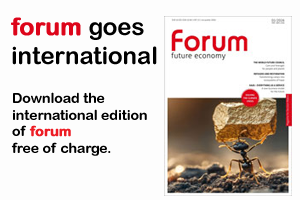Towards a Cultural Leadership for the 21st Century
How leadership teams can be successful in the culture of our times
Changing leadership outlook to incorporate the new cultural necessities is not as easy as it might seem. It takes the development of new abilities that can help re-set business leaders’ perceptions of the relationship of their businesses to society.
When he was Prime Minister, Tony Blair said that it’s not the role of business to solve social problems. Business should just get on with the business of making money and leave social issues to others. How things have changed.
|
Is big business |
Today, business, especially big business, is not popular. Social enterprise is the new buzzword. Rather than being seen as the engine of the prosperity we all seek, business has allowed its image to become transformed into that of the evildoer responsible for many of our social ills. They are failing to play their part in addressing the complex social issues that we all face. Big business is the luxury home of the 21st century robber barons. Or so the narrative goes.
What has changed?
The 21st century culture in which business operates is evolving into something that is fundamentally different from that which Tony Blair expressed in the dying days of the 20th century. Then business could afford to keep away from messy ethical and social issues, follow the rules and get on with the business of making money. No longer. Today, businesses, and their leaders, have no choice but to become deeply embroiled in cultural, social and moral issues that affect our society – and to shoulder directly some of the responsibility for addressing these issues. This requires the development of a different kind of leadership – one that is more deeply embedded in contemporary mores. What will it take to develop this new leadership style?
It’s not so easy
For some commentators, the answers may seem clear. Business leaders must change the culture of their organizations to make them more socially responsible. This is a reasonable starting point. But it is no more than a starting point. How do we get there? It seems only like yesterday that then newly appointed CEO of Barclays Bank (like many other CEOs of many other corporations) Anthony Jenkins announced his "transform” programme that was supposed to regain the public’s trust. A year or so later, his decision to increase bonuses in the face of collapsing profits has been described as a "shameful” confirmation of all that is wrong with bankers.
|
Why do so many leaders fall flat on their face? |
What’s the problem? We have to assume that individuals like Jenkins are honestly trying to achieve change. Yet he, and others, fall flat on their faces at the first turn. Why do competent, high level leaders with seemingly good intentions have such difficulty breaking out of the tired old ways of doing things – ways that we now find culturally unacceptable?
Moving Towards Cultural leadership
We use the term Cultural LeadershipTM to describe a leadership approach that puts at its centre the interdependence between organisations and the cultural context in which they seek to operate. It implies a substantial shift in awareness that requires leaders to view their role within a much larger context. Such awareness reaches beyond concerns about survival, growth and shareholder value to encompass the more far-reaching impacts of their decisions on the well-being of community and society.
Two elements are necessary to move towards effective Cultural LeadershipTM.
Abandon ‘Strategy’
The first is the abandonment of ‘strategy’ as the driving force of long-term business direction. In a fast moving, ever-changing, uncertain, post-modern world, ‘strategy’ in its traditional interpretation, has little value on its own. The idea of planning a long-term strategy and executing painstakingly over time is based on two implicit assumptions. One is that we have a pretty good idea of what the longer term might look like. The second is that there is a modicum of stability in the business environment. In today’s world – and likely more so in tomorrow’s – neither of these assumptions holds true. Business strategies need to be fluid and adaptable to ever more rapid change. While we now all understand perfectly well the need to have adaptable strategies that can react to the rapid changes caused by, for instance, technological disruption, there is less understanding of the impact of cultural disruption. In particular, many have difficulty dealing with the effects of living in a post-modern culture where the concepts like stability, continuity and authority are themselves counter-cultural. Dealing with a culture that is utterly unpredictable, almost totally opaque, empowered, uncontrollable and even chaotic.
|
Strategy must give way to purpose as the highest order of leadership focus |
In such a cultural milieu, strategy must abandon its out-dated position as the highest order of leadership and management endeavour and become a second order item subordinated to and driven by higher order considerations of purpose, values, beliefs, emotions, ethics, and other soft, intangible and difficult to grasp ideas. Concepts that make many senior managers uncomfortable because they do not lend themselves to ‘rational’ analysis or to putting into neat financial models. While strategy still has a place, it becomes a much smaller and a very different one. Strategy becomes a short adaptable and ever-moving set of bridges between purpose and operational excellence.
Looking From the Outside In
The second necessary change is for leaders to learn the skills of looking at their organisations from the outside in rather than the inside out.
|
What is not 'rational' may be more real than that which is |
Sometimes I think of most of us – including senior executives, policy makers and other leaders – as being just like the prisoners in Plato’s cave; prisoners chained so they could only see the wall in front of them. The world outside was passing by the cave and all they could see were the distorted shadows of that reality cast on to the wall. They came to believe that those shadows were reality.
So it is with many major institutions. We largely all live in our own world – our own cave, if you like. We only associate with people who are mainly like us. We read the papers that largely reflect our own views. In major corporations, distorted shadows are brought to senior management through third party market research studies the results of which are filtered and re-filtered before the so-called ‘findings’ make it to senior management. And senior leaders interpret all this ‘information’ through the operational lens of their own organisation. We all end up spending much more time looking at spreadsheets, Powerpoint presentations and perfectly presented reports rather than at the realities faced by ordinary people (ie our customers) in the real world and the attitudes and cultural norms and beliefs that are spreading outside the hallowed walls of our own organisations.
|
We all tend to live in our own world |
Cultural LeadershipTM implies the development of the ability to look at our organisations from the outside in. Instead of having the culture and society in which we operate presented to us filtered through our own organisational lens, we need to develop the skills to learn to look at our organisations from the outside in – as others perceive us. Such understanding needs to go beyond the sterile pictures painted by financial models based on market analysis, customer segmentation, customer preference surveys, customer satisfaction reports and all the other tools with which corporations are fully familiar. They need to provide a more vibrant, albeit necessarily incomplete, understanding of what is a social ecosystem that is organic, fluid, dynamic, unpredictable, driven by a culture that is changing at a revolutionary rate and populated by human beings that in no way fit the economist’s fantasy of ‘rational actors.’ In other words a system that is human not purely financial. This is not achieved by commissioning yet more studies and reports. Rather, organizations need to build what I shall call ‘cultural antennae’ into their DNA.
Changing who we are
Written down here in black and white makes it all seem like a common sense, simple thing to do. This, of course, underestimates the challenges that face business leaders in getting there – which is why most ‘change programs’ continue to fail. The challenges are not just operational ones (those are the easy bits), but challenges associated with something much more deep-seated – the re-framing of self-identity; first of all for the top leadership team and then for the wider organization.
For those who have spent their life in a business community, this represents a very fundamental shift. It requires moving the needs of the organization and its shareholders from being at the centre of thought and action and placing them in the wider context of society and contemporary culture. It goes against everything they learned in business schools, contradicts everything they perceive as having been the basis of their personal success, and requires a fundamental change in leaders’ perception of who they are.
Going beyond the individual
Much has been written about the psychology of change and the role of shifts in awareness in leadership success. From the importance of double-loop learning frameworks for describing how a person interprets events and makes meaning, to ways of addressing adaptive challenges to which there is no known answer, to, most recently, the increasing use of mindfulness training, there are many tools available to business leaders to thrive in the new environment. However, while these approaches move things forward, they remain, on their own, incomplete because they continue to focus primarily on the individual rather than the team.
While corporations have become pretty good at assessing the technical and management skills of individuals, less developed are the skills necessary to build a senior leadership team that transcends the individual and has all the components necessary to push the organisation towards Cultural LeadershipTM. Work we have undertaken with different organisations clearly shows that some leadership teams, while comprised of highly able individuals, lack the team balance and structure that is appropriate for what they are trying to achieve (figure). Building a team that will be successful in today’s cultural milieu needs to go beyond the mere accumulation of highly capable individuals.
Success in 21st Century Culture
I suggest that what is happening around us is one of the most dramatic cultural shifts seen since the Enlightenment – a full five hundred years ago. The central ‘de-realization’ ideas behind our often confusing postmodern culture were possibly first explored as far back as the 18th and 19th century (Kant, Nietzsche, Kierkegaard) and made explicit by Lyotard in 1979. But it is only now, accelerated by the digital revolution, that we are feeling the true force of that cultural transformation; a transformation that is leaving many uncomfortable and disorientated. How does leadership adapt and continue to be successful in the face of such cultural change. I have suggested that a move towards Cultural LeadershipTM can be achieved through a comprehensive programme that examines, among other things, whether existing senior management teams are capable of achieving change as opposed to maintaining operational success under the current paradigms (usually the main reason why they have been successful); building cultural antennae into their organization’s skill set; helping organizations define a broader, more motivating and more resilient sense of purpose; and others.
Like a seed breaking open to allow a plant to grow, how we construct our own selves needs to break open in order to reach a new stage. If we are to facilitate leaders to achieve real change without falling flat on their faces at the first hurdle, we need approaches that invite them to see their beliefs and feelings as products of their conditioning, rather than fixed parts of self-identity.
by Dr. Joseph Zammit-Lucia
Dr. Joseph Zammit-Lucia is a leadership advisor, a Partner at Camunico and president of WOLFOUNDATION.org
Weitere Artikel von Joseph Zammit-Lucia:
Riding the wave of opportunity
The COVID-19 pandemic has upended life as we know it. People are dying. Economies are in freefall. Business is struggling to survive. We are all incarcerated.
Von der strategischen zur intuitiven Führung
Kulturelle Veränderungen werden die Anforderungen an Führungskräften dramatisch verändern.
Nur Leadership Teams können die Herausforderungen unserer Zeit erfolgreich meistern.

forum Nachhaltig Wirtschaften heißt jetzt forum future economy
forum 01/2026
- Zukunft bauen
- Frieden kultivieren
- Moor rockt!
Kaufen...
Abonnieren...
JAN
2026
Impulse, Herausforderungen und Lösungswege
86159 Augsburg
FEB
2026
Professionelle Klimabilanz, einfach selbst gemacht

Einfache Klimabilanzierung und glaubhafte Nachhaltigkeitskommunikation gemäß GHG-Protocol
Klima
 Wenn Klimaschutz nur der Ökonomie schadet...
Wenn Klimaschutz nur der Ökonomie schadet...Christoph Quarchs Überlegungen zur Generationengerechtigkeit
Jetzt auf forum:
Rat für Nachhaltige Entwicklung neu berufen
Sperrmüll vs. Entrümpelungsfirma: Wann lohnt sich professionelle Hilfe?
BAUExpo 2026 vom 20. bis 22. Februar in Gießen
CO2-Preis: Bundesregierung sollte zu Koalitionsvertrag stehen


















